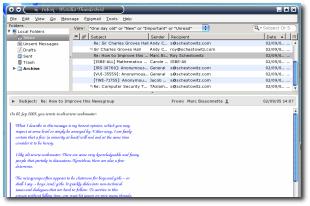Mail Readers Survey
As we approach the end of yet another year, some might ponder:
“what does each mail management method have in store?
I shall attempt to point out several facts and add my opinions, not necessarily in a most coherent manner. I chose to compose this item as streams of consciousness loosely glued together.
Local Mail
Outlook should not be considered the “gold standard”, i.e. one to compare most applications against. Thunderbird, a Mozilla Mail (Netscape) derivative, can be re-enforced by a powerful set of extensions among an endless ‘pool’. It can then becomes extremely powerful and versatile, much like Mozilla Firefox. It then becomes the most valid benchmark reference, which is rather hard to match.
Themes in Thunderbird are more visually appealing than most (I use an Aqua lookalike theme as shown below) and they are applied to the application as a whole, as broad as it may be in terms of functionality and widegets. Thunderbird is very stable and is — as always expected — cross-platform. Version 1.5 is now in beta and the inimitable Brent O’Connor gave it the thumbs up a couple of days ago.

A shrunk-down screenshot of CrossOver-themed Thunderbird
Also see an older overview and comparison of mine which involved Outlook and Thunderbird.
Personal Remote Server
There is a true danger which lies in remote mail storage, i.e. mail that gets stored elsewhere, as opposed to the owner’s hard-drive. I once discussed the rudimentary choice between Web-based and locally stored mail.
If you opt for a rich on-line mail management tool, seek functionality and speed. I personally like the Zimbra interface a great deal. It requires some decent specifications as well as good bandwidth though. I recently recommended this tool in UseNet, having come across that fascinating Web application only days ago.
There are also free programs that can manage mail on one’s own domain. SquirrelMail is terrible from a productivity point-of-view and NeoMail is buggy. For remote mail and handling of several accounts in tandem I use the latest of Horde (formerly Imp) , which is fantastic. Filters, for example, are very powerful, as previously illustrated. The filters almost make Horde comparbale, efficiency-wise, with local mail clients.
Hosted E-mail Accounts
A few days ago I came across an article which criticised decisions made arrogantly by the GMail (Google Mail) team. Yahoo Mail was said to be superior. The article suggested: Yahoo E-mail delivers that desktop feel most users expect. MSN and Hotmail, on the contrary, no longer see the sun shine. The Microsoft on-line services have accumulated billions in losses despite being default placeholders (front page/home page) in Internet Explorer. Internet Explorer is bundled with Windows and cannot be uninstalled, one might wish to add.






 Filed under:
Filed under: 
 HERE has been a recent shakeup in the O/S battlescene. Many factors led to the narrow existence of Linux, Windows and the Mac in that conceptual picture which contains significant platforms. Other platforms are no longer catered for; support for them becomes a rarity.
HERE has been a recent shakeup in the O/S battlescene. Many factors led to the narrow existence of Linux, Windows and the Mac in that conceptual picture which contains significant platforms. Other platforms are no longer catered for; support for them becomes a rarity.
 ROWING criticism becomes apparent as personal information on the Internet breaks new boundaries. This recently had CNET ignored by Google. CNET correspondent bluntly
ROWING criticism becomes apparent as personal information on the Internet breaks new boundaries. This recently had CNET ignored by Google. CNET correspondent bluntly 

 ANY must have wondered why the latest version of Windows, namely Windows XP, dates back to the end of 2001. Moreover, one might ask, why has it been so fragile and susceptible to attacks? Service packs were merely a plaster that covered up a variety of loopholes. Monthly security patches did not help credibility either.
ANY must have wondered why the latest version of Windows, namely Windows XP, dates back to the end of 2001. Moreover, one might ask, why has it been so fragile and susceptible to attacks? Service packs were merely a plaster that covered up a variety of loopholes. Monthly security patches did not help credibility either.

 A BusinessWeek article relating to
A BusinessWeek article relating to